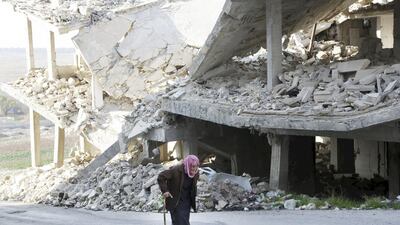At long last, the United Nations Security Council has agreed on a resolution that, if implemented, would bring about some relief for a country torn apart by civil war.
The UN agreed to Resolution 2254 last Friday and the announcement received mixed reviews. Regardless of its exact merits, the resolution faces a far bigger challenge now.
Writing for the Lebanese daily Annahar, columnist Amin Kamourieh noted that the UN has always had a double-standard when it comes to its own resolutions. Some resolutions are issued and never implemented, either on purpose or because they become redundant, such as the series of resolutions on the Palestinian-Israeli conflict.
Other resolutions are implemented even before they are officially announced such as Resolution 660 concerning the Iraqi invasion of Kuwait, which was a preamble to the American invasion and occupation of Baghdad.
“For the first time, the political negotiation option seems more serious than ever before. This couldn’t have happened if it weren’t for the strategic change brought about by Russia’s military intervention in Syria, which forced the West out of its hesitant stance and into adopting a solution-conducive position,” he said.
The key now is to test Russia’s ability to keep the Syrian regime in place and to coerce the regime’s Iranian allies to offer the constructive concessions needed for a permanent solution.
Writing in the Abu Dhabi daily Al Ittihad, the sister publication of The National, Abdullah bin Bajad Al Otaibi suggested that despite the conflicting reactions to the UN resolution on Syria, its presence is good because of the rare US-Russian agreement that was needed to get the resolution on the table.
Moreover, there are several European countries championing the rights of the Syrian people and supporting the moderate Syrian opposition while rejecting Bashar Al Assad that were part of the resolution. These countries, in collaboration with Arab countries in the region, can provided support for a unified Syrian opposition.
Therefore, the most important step in the immediate future, according to the writer, “is for the Syrian opposition movements, parties and factions to join forces to preserve the united front that was established in Riyadh, and remain the main voice of the Syrian people.
“Transcending conflicts is the first and essential step towards an optimal political solution in Syria for the international community and the region as a whole. Without unity, all the support from Saudi Arabia and other Gulf countries would be in vain,” he added.
An opposition front, capable of working through all of the differences that exist, to maintain the cohesion of Syria as a unified state is paramount for the interests of the Syrian people
Syria is a multifaceted country that is home to people from multiple religions. For the country to remain whole and complete, it needs modern leadership that gives minorities protection and rights for all citizens.
In other words, the country needs leadership that can show a measure of political flexibility to ensure the interests of the Syrian people. This must be part of any resolution to this tragic civil war.
Translated by Racha Makarem
rmakarem@thenational.ae

